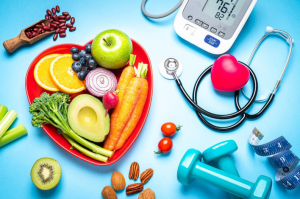By: Dara L. LoBuono & Jenna Bottiglieri
The Center on Nutrition and Disability, a resource derived from the Family Resource Network, aims to provide persons with disabilities and their caregiver(s) the tools to promote healthy behaviors throughout their lifespan. The purpose of Inclusive Nutrition Standards of Care and Guidelines for Implementation is to promote healthy dietary patterns and wellness. These eight Standards provide inclusive resources based on evidenced-based practices and cultural diversity in New Jersey. Below we summarize key points from the eight Standards. If you would like to read the full standards in detail click here.
- Persons with Disabilities Should Have Access to Safe and Adequate Nutrition
This standard highlights food safety handling and practices, including hand washing before cooking and consuming food, washing surfaces and utensils properly to avoid cross contamination, rinsing fresh fruits and vegetables, and storing food.
Kitchen safety and safe food consumption for all abilities are addressed. Adaptive equipment is discussed to highlight how persons of all abilities can be included in food preparation.
Resources around safe swallowing, and managing food allergies to ensure safe and optimal nutrition are discussed.
- Persons with Disabilities Should Consume a Dietary Pattern that Promotes Health and Weight Management and Lowers Risk for Common Chronic Diseases and Conditions
This standard focuses on promoting a healthy dietary pattern for persons living with disabilities across the lifespan. The recommendations within this standard are adopted from the Dietary Guidelines for Americans but consider unique factors that persons with disabilities may live with that impact dietary intake.
Key components of a healthy diet include:
1) Balance: consumption of all food groups ( whole grains, fruits, vegetables, low fat dairy and lean protein)
2) Moderation: incorporating foods within all categories and varying nutrients in modest amounts
3) Variety: consume different foods within each food group to ensure adequacy of each nutrient
4) Adequacy: chose quality foods that meet your nutritional needs
It is best to limit foods and beverages high in added sugars, saturated fat and salt, such as chips, crackers, cookies, cakes, candy and soda.
- Promote bone and muscle health with physical activity and having 2-3 servings of dairy or a dairy alternative
Standard three summarizes the key diet and exercise components necessary to promote bone and muscle health for children and adults. Special considerations are made to promote physical activity for all abilities. Physically active adults are healthier, feel better, and are less likely to develop chronic diseases than inactive adults. Sources of calcium and vitamin D, key nutrients for bone health, are discussed.
- Persons with Disabilities Should Maintain Adequate Hydration Daily
This standard describes the importance of staying hydrated as well as healthy beverages to choose from that are low in sugar and empty calories, such as water, fat-free and low fat milk, and 100% juice. The amount of fluid a person needs daily is discussed.
- Persons with Disabilities Should Be Offered Three Meals and Healthful Snacks at Appropriate Times and Environment Each Day
Standard five summarizes the importance of eating three balanced meals and snacks throughout the day, and describes the necessity of having a mealtime routine to prevent meal skipping.
- Persons with Disabilities Should Be Provided Individualized and Culturally Appropriate and Appealing Nutritional Choices
Persons with disabilities will have individualized choices to meet adequate nutrition. Individuals may experience sensory processing issues that can impact mealtime enjoyment as well as taste and texture preferences. Tips for introducing new foods are provided as well as ensuring these foods are appealing and culturally appropriate for the individual.
- Cost, Planning, and Accessibility Barriers Should be Addressed When Implementing Inclusive Nutrition Standards of Care
Standard seven provides resources to overcome cost, planning and accessibility to nutritious foods that persons with disability and their families may face. Local and state resources throughout New Jersey are provided along with templates for creating a grocery budget and weekly meal plans.
- Therapeutic Individualized Diet Prescribed by a Physician or Registered Dietitian May Override Other Standards of Care Recommendations
Adults with disability experience certain health conditions may need the support from a Registered Dietitian Nutritionist (RDN).
RDNs can help translate nutrition science into practical applications to improve diet quality.
RDNs can help ensure adequate nutrition through general healthy dietary patterns, help those who are following a specialized diet to manage a condition, and assist those with food allergies and intolerances.
To find a RDN near you visit: https://www.eatright.org/find-a-nutrition-expert
These eight Standards have been established to promote healthy diets for persons with disabilities, as well as serve as a resource for families using a person-centered approach; however they are not meant to take the place of tailored information from your doctor or registered dietitian/nutritionist.





